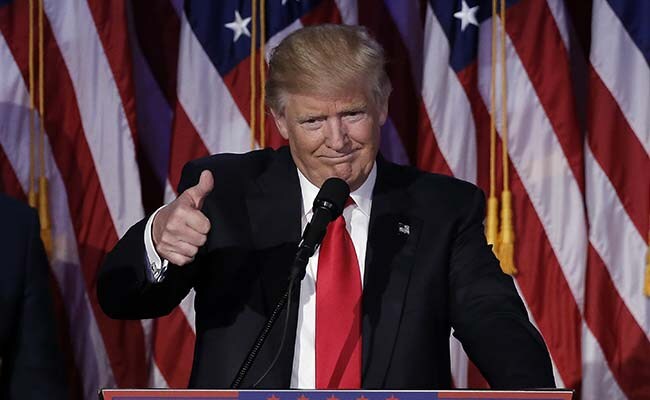
Donald Trump often targeted China in the campaign, blaming Beijing for US job losses.
Washington:
Chinese state media has warned Donald Trump against isolationism and interventionism, calling instead for the United States to actively work with China to maintain the international status quo.
President-elect Donald Trump threatened to tear up trade deals and pursue a more unilateral foreign policy under his "America First" principle during a tempestuous election campaign.
But China and other foreign governments are uncertain how much of Trump's rhetoric will be translated into policy because he has at times made contradictory statements and provided few details of how he would deal with the world.
Trump often targeted China in the campaign, blaming Beijing for U.S. job losses and vowing to impose 45 percent tariffs on Chinese imports. The Republican also promised to call China a currency manipulator on his first day in office.
U.S. isolationist policies had "accelerated the country's economic crisis" during the Great Depression, warned a commentary by China's official Xinhua News Agency, though it added that "election talk is just election talk".
The commentary also cautioned against any tilt towards intervention.
"History has proven that U.S. overseas military interventionism causes them to pay disastrous political and economic costs," the commentary said.
Hillary Clinton was widely seen in China as the more hawkish of the two candidates, while some Chinese commentators saw Trump as a potential pragmatist on foreign policy.
But Beijing fears the unpredictability of a Trump presidency as it seeks to maintain an equilibrium in Sino-U.S. relations while dealing with the daunting tasks of a reform agenda to combat a slowing economy at home.
A second Xinhua commentary published on Thursday morning said the new U.S. president and China should "jointly build a new model of major power relations". That echoes the position of Chinese President Xi Jinping that says global powers should work to accommodate, not contain, a rising China in the international system.
The Global Times, a tabloid published by the ruling party's People's Daily newspaper, said Trump's victory had "dealt a heavy blow to the heart of U.S. politics" but that he would be unable to make many changes in U.S. foreign policy.
"In an elite-controlled U.S., most of those holding power don't support Trump. And U.S. allies across the world will pressure Washington to restrain Trump from isolationism," it said.
President-elect Donald Trump threatened to tear up trade deals and pursue a more unilateral foreign policy under his "America First" principle during a tempestuous election campaign.
But China and other foreign governments are uncertain how much of Trump's rhetoric will be translated into policy because he has at times made contradictory statements and provided few details of how he would deal with the world.
Trump often targeted China in the campaign, blaming Beijing for U.S. job losses and vowing to impose 45 percent tariffs on Chinese imports. The Republican also promised to call China a currency manipulator on his first day in office.
U.S. isolationist policies had "accelerated the country's economic crisis" during the Great Depression, warned a commentary by China's official Xinhua News Agency, though it added that "election talk is just election talk".
The commentary also cautioned against any tilt towards intervention.
"History has proven that U.S. overseas military interventionism causes them to pay disastrous political and economic costs," the commentary said.
Hillary Clinton was widely seen in China as the more hawkish of the two candidates, while some Chinese commentators saw Trump as a potential pragmatist on foreign policy.
But Beijing fears the unpredictability of a Trump presidency as it seeks to maintain an equilibrium in Sino-U.S. relations while dealing with the daunting tasks of a reform agenda to combat a slowing economy at home.
A second Xinhua commentary published on Thursday morning said the new U.S. president and China should "jointly build a new model of major power relations". That echoes the position of Chinese President Xi Jinping that says global powers should work to accommodate, not contain, a rising China in the international system.
The Global Times, a tabloid published by the ruling party's People's Daily newspaper, said Trump's victory had "dealt a heavy blow to the heart of U.S. politics" but that he would be unable to make many changes in U.S. foreign policy.
"In an elite-controlled U.S., most of those holding power don't support Trump. And U.S. allies across the world will pressure Washington to restrain Trump from isolationism," it said.
Track Latest News Live on NDTV.com and get news updates from India and around the world

